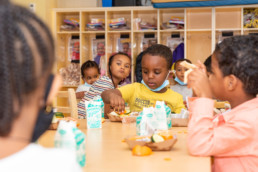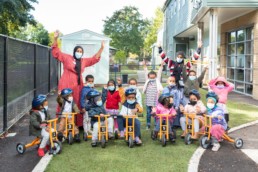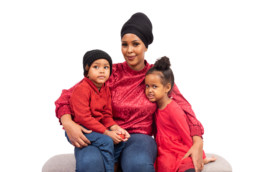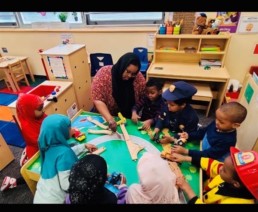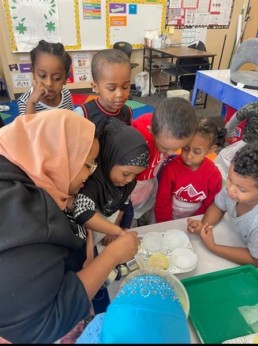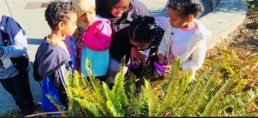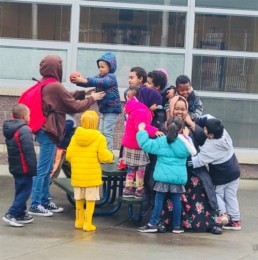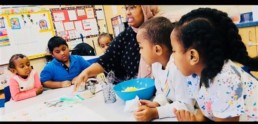The Mind, Body, and Culture wraps up its second year with notable successes
Voices of Tomorrow’s Mind, Body, and Culture program is the first of its kind to integrate home visits with trauma-informed therapy. The two-year pilot phase of the MBC program, which is aimed at families and children from birth to age 3, finished with notable successes in assisting families and enhancing parent–child connections. This ground-breaking initiative gave over a thousand resources to families which provided critical support, especially during the COVID-19 pandemic. These resources included necessities like diapers, wipes, strollers, car seats, and winter clothes.
Since its inception, it has demonstrated its value in treating mental health and creating resilient families. So far, more than 60 families have received assistance from the MBC program, building a community of parents through its "Promoting First Relationships" curriculum. Beyond verbal communication, the MBC program helps parents build stronger bonds with their young children. The program also offers parents activities and suggestions to include and encourage for their older children, extending its reach to older siblings in East African immigrant and refugee households.
The MBC program’s impact extends beyond children. One of its most remarkable accomplishments to date is its commitment to helping parents pursue their educational and career aspirations. Many parents signed up for the fall semester of school, and the program assisted them with FAFSA and the application process. Through their efforts to help parents in addition to children, the MBC program opens doors of opportunity and success for the entire family.
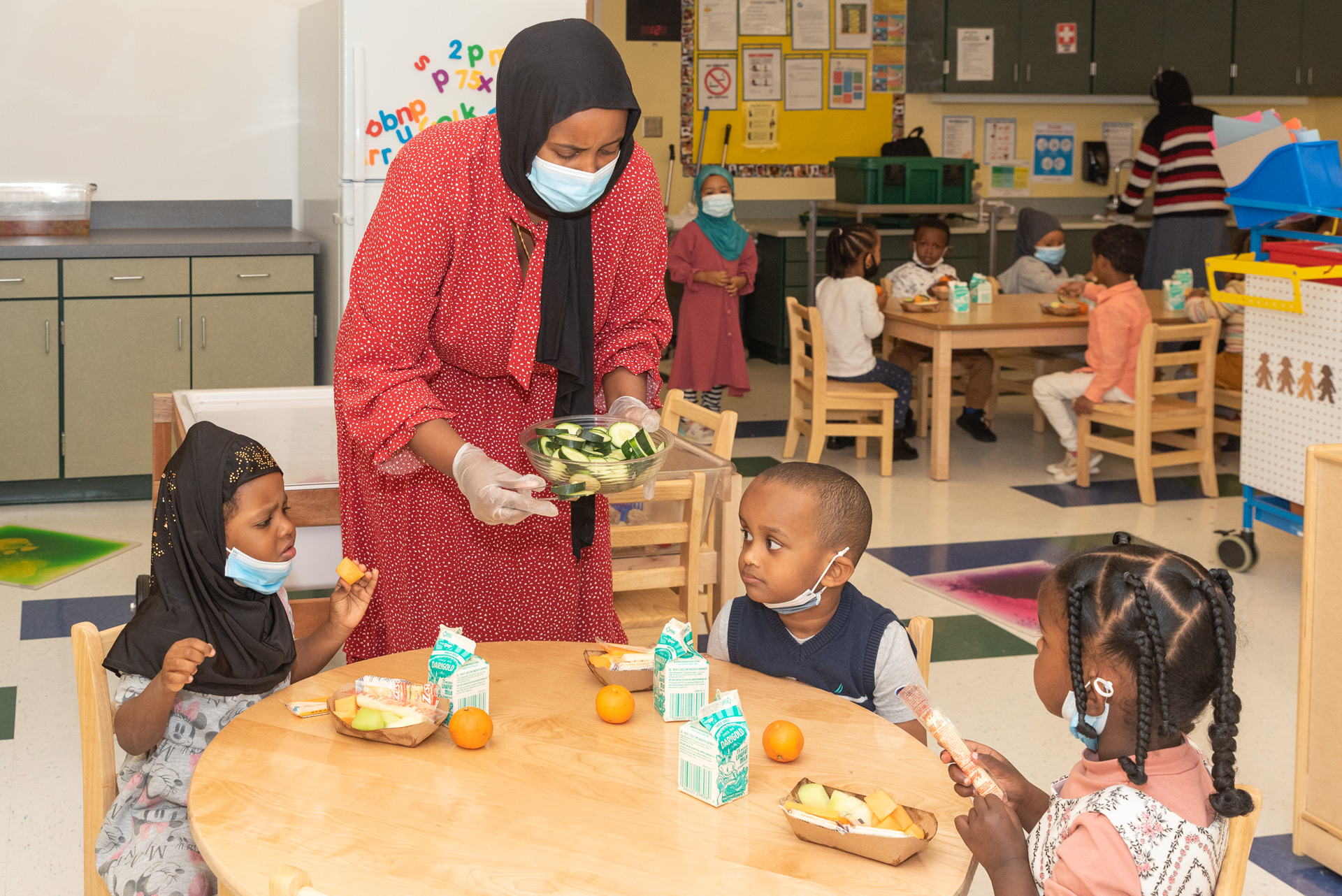
Another way that the MBC program fosters a close-knit community is that it allows parents to engage in an open dialogue about the issues and shared experiences that affect them. The program demonstrates Voices of Tomorrow’s dedication to respecting and understanding various cultural backgrounds through health-related topics, like making wise decisions during Ramadan.
During the two-year pilot phase, home visitors continued their efforts to link families with resources and pathways to stability despite having to contend with busy schedules and parents returning to school or work. The program's flexibility allows parents to request help with everything they need, assuring a customized strategy to handle their circumstances.
VOT is devoted to helping families even throughout the summer as the staff move into their planning phase. The MBC program is structured around the family, devoting an hour to meetings with parents, with the first half concentrating on establishing the first connections. The remaining time is spent addressing any unique requirements parents may have and creating a secure and encouraging atmosphere.
By surveying families at the beginning of the program, the MBC team is able to monitor changes and advancement throughout time, highlighting the program's success in fostering positive improvements in families' lives.
Voices of Tomorrow’s MBC program is committed to enhancing and expanding the influence it has on local families. The program's effectiveness and ongoing demand for its services have encouraged its continuous development to guarantee that East African immigrant and refugee families continue getting the resources and help they deserve.
What it’s like to spend a day in Voices of Tomorrow’s preschool
In Somali, there is a word that symbolizes hope and prosperity. Saytuun, an evergreen tree that has been cultivated since ancient times, is known for its valuable oil and its ability to survive in harsh environments. The saytuun olive branch is a representation of friendliness and peace. Just like how an olive tree symbolizes hope, so do the students in Voices of Tomorrow’s Saytuun classroom.
Saytuun is a preschool classroom offered by Voices of Tomorrow (VOT) that fosters a warm and welcoming environment for children. The classroom is decorated with shades of green and brown, reminiscent of the colors of an olive tree. VOT works to cultivate a brighter tomorrow for today’s children through programs that educate elevate and empower the East African community. VOT introduced the first Somali English dual language preschool program in the world, where children are encouraged to explore, learn, and grow in a safe and nurturing environment while embracing diversity and accepting their differences. The Saytuun classroom instills these values in its students, preparing them to become responsible and compassionate individuals in society.
The children in the Saytuun classroom are taught to respect each other and resolve conflicts peacefully. These values are essential for children to learn as they grow and interact with other people in the community. Teacher Sonia Ruiz strives to listen to each child's concerns and needs, allowing them to communicate their likes and dislikes. She wants her students to develop communication skills and become aware of their own emotions so they can learn how to effectively communicate with others. She does this by going above and beyond to make sure that students who need extra support receive proper encouragement and more time to understand a topic in class. Ruiz also gives her students the option to choose their downtime activity each day, allowing them to build confidence in their own decisions. When a student changes their mind, Ruiz asks what the student dislikes about their current activity and then helps them find an activity that she thinks suits their preferences.
The skills developed in a dual language program get passed onto the next generation. Saytuun trees are equipped to handle harsh environments. VOT’s Saytuun classroom prepares its students to do the same. While the mainstream school system is just now realizing the importance of diversity and inclusion, VOT’s preschool was founded to uplift East African immigrant and refugee children. In the long run, preschool programs like the Saytuun classroom ensure our children will prosper in a world that was not designed for them and without them in mind.
How the Mind, Body, and Culture Program is supporting East African parents to build better parent-child relationships.
Somali parents express their love for their children through actions and gabay (poetry). If they could move mountains for their children, they would. Many Somali parents migrate to western countries with the hope of a better life for their children. However, they often sacrifice their own desires to allow their children to build a beautiful tomorrow. In doing so, they also tend to let their mental health slip through the cracks. This is where Voices of Tomorrow (VOT) comes in with the Mind, Body, and Culture (MBC) program, which is the first and only program of its kind aimed at promoting parent mental health in the East African community because VOT understands the cultural barriers that these parents face when it comes to merging their new world with their already existing one. The program helps parents understand that putting themselves first allows them to become better equipped to take care of their children.
Dahabo Khalid, a mother who has been working with the MBC program for over a year, shares that when she began this program she was always on the go, and rarely took time for herself. She describes how most Somali parents consider attending a wedding or family gathering as taking time for themselves. Now, almost two years later, Khalid makes time for herself weekly with the encouragement of her home visitor. She takes herself to the salon regularly, recently she went to a private steam room with her friend as a mom’s night out event. The MBC program, however, goes deeper than just surface-level aesthetic self-care.
An important skill Khalid learned through this program was understanding ways to grow the bond between her and her daughter. Every week, Sahra Abdullahi, an MBC home visitor, and Khalid work through a parent-child handout. This week, by using a handout focused on encouraging cooperation in everyday moments, Abdullahi was able to help Khalid understand that learning her child’s personality trait is key to a successful parent-child relationship. Sometimes, children are seen as just children, but it is important to really understand your child’s individuality. Learning the things, they like and do not like allows you to communicate with your child the way they need. Khalid learned that treating all children the same way is not effective, and understanding their uniqueness enhances the parent-child relationship.
Another takeaway for Khalid from these handouts was setting clear expectations and flexible limits. This means the child’s age needs to be considered when setting expectations for them and adjusting it accordingly as they grow older. Giving them choices to build their confidence and feel independent is equally important, even at an early age. Many parents view a protest as rebellion, but the home visitor helped Khalid see the world through her child’s eyes. Abdullahi showed Khalid how easy it is to resolve things with children through proper communication.
She used an example of a child who was doing arts and crafts. After a few minutes, the mother saw the child drawing on the wall. Instead of raising her voice, the mother asked her child, “What led you to draw on the wall?” The child answered, “My paper wasn’t big enough.” After analyzing this story, Khalid understood that all actions are not a sign of rebellion; the child saw a blank canvas where she could continue to draw. Abdullahi said, “At the end of the day, it’s important to understand your child is also their own person and they want their ideas to be valued.”
When kids throw tantrums, it is important to have conversations so they can understand you and so you can better understand them. Khalid said the MBC program taught her more than how to be a mother. “I already know how to do that because I'm on my third child,” she said. "What this program has allowed me to do is understand my children better and how to engage with each one of them accordingly.”
The MBC program not only supports parents' mental health and encourages parent-child bonding, but it also assists parents by providing essential materials they need to take care of their children. MBC partners with Eastside Baby Corner (EBC), a non-profit organization that works with local agencies to bring essentials to local children living in poverty and crises, to order free diapers, strollers, car seats, milk, and many other items that would aid the parents in caring for their child. The previous program Khalid was a part of was more child-focused, but when MBC began working with EBC early last year, Khalid was delighted and surprised that her home visitor could provide her with the necessary and practical items she requested. For example, she received a brand-new pink car seat that was a perfect fit for her daughter. The benefits of this program go beyond just Khalid and her household, as it teaches a community how to foster communication with children while not forgetting to take care of themselves.
Why the Mind, Body and Culture program is essential to Families residing in King County's East African community.
We are excited to share some success stories of our families who benefited from the Mind, Body, and Culture (MBC) program, which is specifically designed to support children and families in King County’s East African community. The program integrates mental health and Trauma-informed practices into our existing home visiting services with a focus on pregnant mothers, infants, and toddlers. By connecting Mind, Body, and Culture, the program aims to change community attitudes toward mental health.
The MBC is the first of its kind, and its dual Somali-English aspect has been able to bridge the gap for families who may have experienced mental health, education, economic, social/emotional health, and well-being disparities. The MBC home visitors work with parents and caregiver’s biweekly to cover diverse topics that are crucial for the heathy development of their children and the well-being of the family. The program currently supports 60 families and their children.
What sets the MBC apart from other home visiting programs is its emphasis on relationship building. Instead of jumping straight into discussion issues, home visitors focus on building trust and confidence with the families. They convict one-two hour sessions to learn about the family’s assets, strengths, languages, and culture as a unit.
One of our Family members that has received help from the program is Jamila Ali and her daughter. Jamilah had been struggling to ask for help, but with the support of her home visitor, Sahra Abdullahi, she was able to overcome her fears. Sahra reminded her that whoever she asked for help was likely the person who would help her. This advice has stayed with Jamilah ever since, and she feels much more confident about reaching out for support. When she ran out of her daughter’s thyroid medication and she did not have any money, she turned to Sahra for help. Sahra supported her in getting an appointment the next day and provided emotional support throughout the process. Thanks to the dual language aspect of this program, Jamilah was able to express her concerns to Sahra in Somali, and Sahra was able to understand and help her.
Through the program, Jamilah has learned the importance of self-care and goals. She has learned to celebrate herself, appreciate her journey, and plan for tomorrow. Jamilah says, “there are a lot of moms struggling who don't know where to begin or how to ask for help, like me.” She continues to say that “programs like this help moms figure out where to start in their goal, you have someone you can call to help connect you to resources you might not have known existed.”
Goal setting is a core aspect of the MBC program, and it allows the client to break down their main goals into what they want to do and what they need to do. For Jamilah, her main goal was to further her education while being able to take care of her daughter. Sahra worked with her to complete the FAFSA application and find a school that fits her lifestyle and needs. Jamila is now enrolled in Highline College and plans to major in business to open her own store. Jamilah was able to visualize her goals with the home visitor and create a feasible plan to achieve them. She says that she finally sees the progress she has made since starting the program.
The MBC program has been able to support families like Jamilah’s in a holistic way by addressing their mental, physical, and emotional health needs. By providing personalized support, the program has helped families overcome barriers and achieve their goals. It is clear that programs like MBC are essential to East African children and families residing in King County.
Nima Ali and Black History Month
As the month of February comes to an end, the significance of Black History Month will continue. It is our job not to constraint such an important topic to just one month. Black history is every day, every month, and more importantly it is present everywhere.
Voices of Tomorrow’s preschool teachers are positively impacting black students in the East African community one classroom at a time. Making early education accessible using a dual language program has helped many teachers at this school to better connect with their students. As well as having teachers that reflect who the students are. Today, we are highlighting a remarkable teacher who has embraced her students and created an impactful and fulfilling learning environment.
Nima Ali is a teacher at Voices of tomorrow’s Bowlake location. Just like many of the students in her classroom, Nima wears a hijab for religious purposes. It is beneficial for a young black Muslim child to see representation of themselves in their teachers. Nima says that “it boosts the academic performance of students of color, including improvement in their development. This allows students to interact in a wider range of social groups and feel more confident in themselves as well as in their interaction with others.” Nima completed Early Childhood Education and is currently pursuing a Bachelor of Art Degree. For Nima, teaching at a school that offers a dual language program was important, being able to help nurture a child’s native tongue cultivates child to become bilingual-bicultural. “Not only does it help them stay grounded to their roots, but it also gives children a variety of economic, cultural, cognitive, and psychosocial advantages,” says Nima Ali. She spent many years volunteering at local elementary schools, daycares, and community organizations, which shows Nima’s dedication to supporting children. Now, Nima is focused on completing her BA and she is excited to be able to bring her love of art to her students.
It is important for us to acknowledge the importance and benefits of having diverse teachers. When I visited her classroom, I was greeted with many different bright colored hijabs. There was pink, blue, white, and some more variations of pink. The atmosphere of a classroom like this was different, it was wholesome, and it was healing. Many black children don’t feel represented in the world but having classrooms like this where it is tailored to them specifically is amazing. As we reach the end of Black History Month, remembering the past historical events, acknowledging the present change, and working towards a better tomorrow is not just on Black History Month. Black history is every day, every month, and more importantly it is present everywhere even in VOT’s classrooms much like Nima Ali’s.
